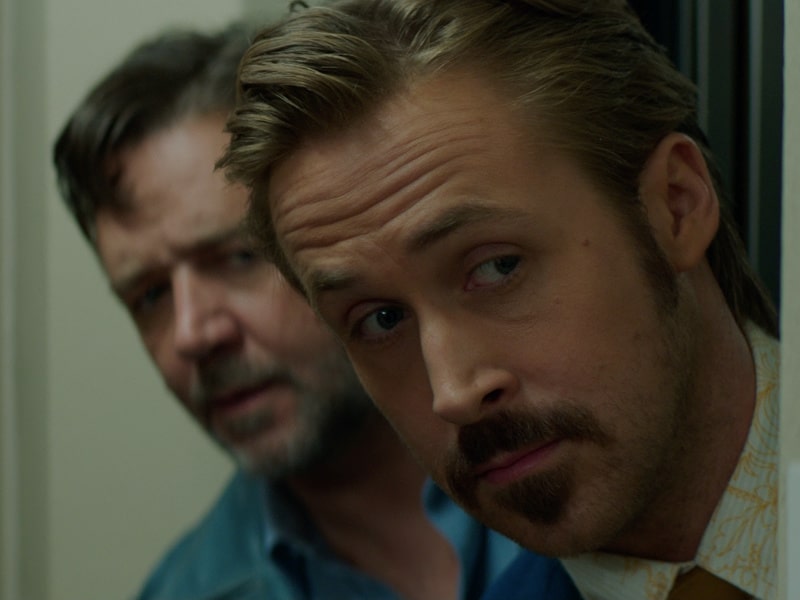
It’s almost time for Shane Black’s hysterical buddy comedy/cop thriller The Nice Guys, starring Ryan Gosling and Russell Crowe.
Playing Holland March and Jackson Healy respectively – two private investigators (sort of) in search of an adult film actress to solve a mystery involving another – these nice guys find themselves in the thick of the porn industry and corporate corruption in Black’s latest, set against the crumbling, ostentatiously styled, smog-covered Los Angeles of 1977.
Black’s masterful film is a perfect blend of various genres, with recognizable tropes of each often turned on their heads with a wink. In anticipation of its release on Friday, I put together a list of films that will collectively pull you in the approximate coordinates of its universe.
It goes without saying that Black’s previous works as a scribe — especially the Lethal Weapon series, Last Action Hero and Kiss Kiss Bang Bang — are the first absolute musts if you haven’t seen them. Unsurprisingly, there are plenty of instances in The Nice Guys where Black borrows from his own work. An early shot in the film that nods to the opening of Lethal Weapon – where a gratuitously bare-chested beautiful woman falls to her death (a retro visual detail that has always stung my eyes) – is especially hard to miss. A mild spoiler: it’s almost as if Black purposefully pulls a blanket over her here.
So, without further ado:
Boogie Nights (Paul Thomas Anderson, 1997)
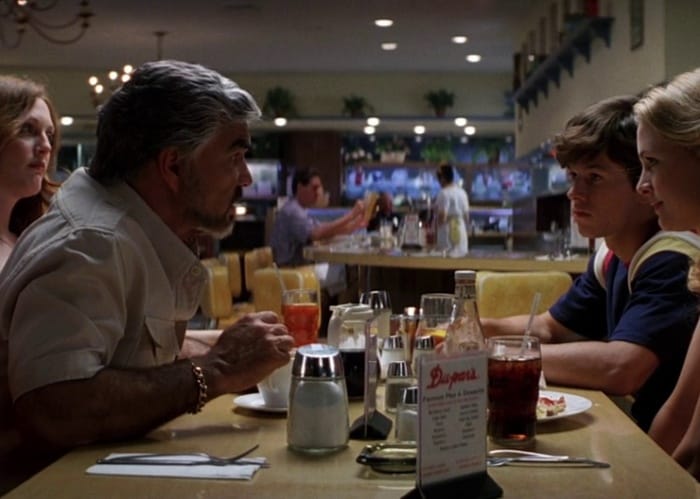
Dirk Digglers, Rollergirls, Bucks, Ambers and Jack Horners of the golden age of porn – wearing sparkly, dazzling 70s outfits and partying in grand Hollywood Hills homes – are everywhere in The Nice Guys, as the film shares its backdrop with Anderson’s rise-and-fall biopic. Sure, it’s not a detective film featuring private eyes with a mystery to solve, but the visual razzle-dazzle of Boogie Nights will still put you in the territory of Black’s playground, with Los Angeles taken over by the peak of the porn industry. While The Nice Guys captures more of the 70s grit (and its approach to the period is not as loudly punctuated as Boogie Nights’), paying another visit to Anderson’s flick will get you in the right mindset.
Chinatown (Roman Polanski, 1974)
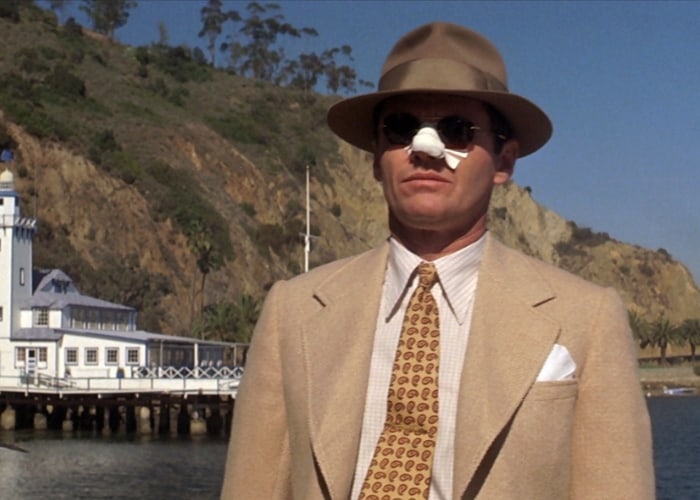
Noir brushstrokes on The Nice Guys might take you by surprise, as the film’s marketing doesn’t necessarily hint it. Also unforeseen is the environmentalist spin of the story, which surfaces gradually as March and Healy dig deep into their search for a character named Amelia (not only an adult entertainer, but also a dedicated environmentalist) and meet corrupt stakeholders within the automotive industry along the way. All these components make Roman Polanski’s 1930s/Los Angeles-set noir Chinatown – packed with murders and deception in the midst of complicated water disputes – creep into one’s consciousness. Surely, neither March nor Healy can match the competence and charisma of Chinatown’s private eye J.J. Gittes (Jack Nicholson), and the father-daughter relationship at the heart of The Nice Guys is thankfully decent and heartwarming (unlike the twisted, incestuous one in Chinatown.) But Polanski’s classic still has a major place in the fabric of Black’s skilled amalgamation of genres.
The Long Goodbye (Robert Altman, 1973)
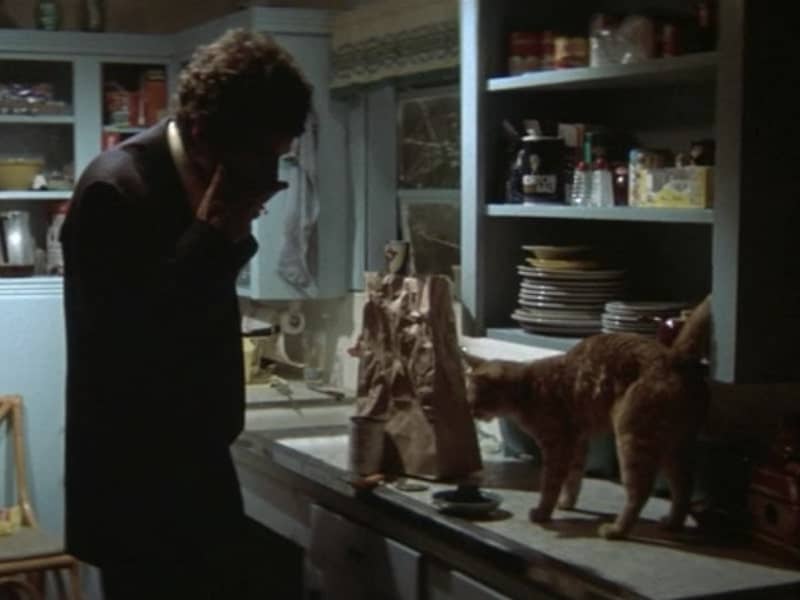
The Nice Guys opens with a bird’s-eye view of Los Angeles at nighttime, first seen through the crumbling Hollywood sign of the era, with the camera approaching and zeroing in on a particular, unremarkable house. This geographic orientation can be deemed a faint echo of the opening of Altman’s neo-noir: bright lights seen from over the hills are followed by a close-up of a bedside artwork of the Hollywood sign, before panning right to reveal our hero – private eye Philip Marlowe (Elliott Gould, playing one of the renowned iterations of Raymond Chandler’s infamous character) – and his semi-domesticated apartment. With interconnected mysteries that drive each other, a deceitful femme fatale, themes around loyalty and integrity and subtle humor apparent from its early moments, Altman’s film receives a nod from The Nice Guys through two (ultimately nice) heroes, also trying to find their way inside a labyrinth of whodunit.
Klute (Alan J. Pakula, 1971)
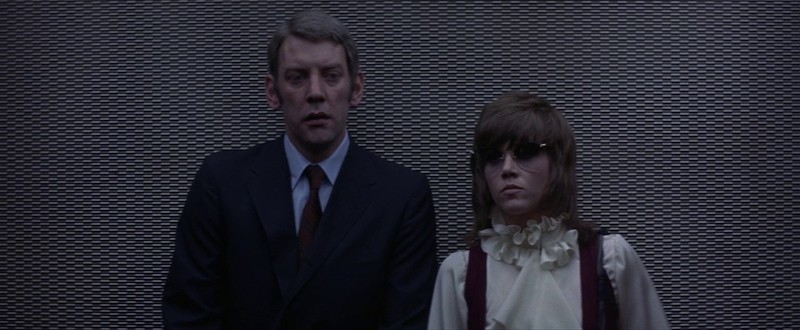
On the surface, Pakula’s film is a far cry from Black’s comedy. Klute is dark, severe, set on the opposite coast, follows a solo private eye as opposed to a duo (at least, at first) and operates not only as a crime/thriller but also as a relentless character study. Still, the parts of its aura and thematic foundation that inform The Nice Guys cannot be missed. As the private eye John Klute (Donald Sutherland) and Bree Daniels (Jane Fonda) – a call-girl he was originally after to solve a disappearance – team up to find a missing prostitute in search of answers to Klute’s larger case, masks fall, leads get murdered, and windows either shatter or serve as passageways leading to the death of various stakeholders. The Nice Guys is a comedy first and foremost, but when darker and more serious sides of the story take over, visual and thematic signposts leading up to 70s crime flicks like Klute are seen everywhere, with moody locations, dimly-lit interiors and adult entertainers in peril.
Abbott and Costello Meet Frankenstein (Charles Barton, 1948)
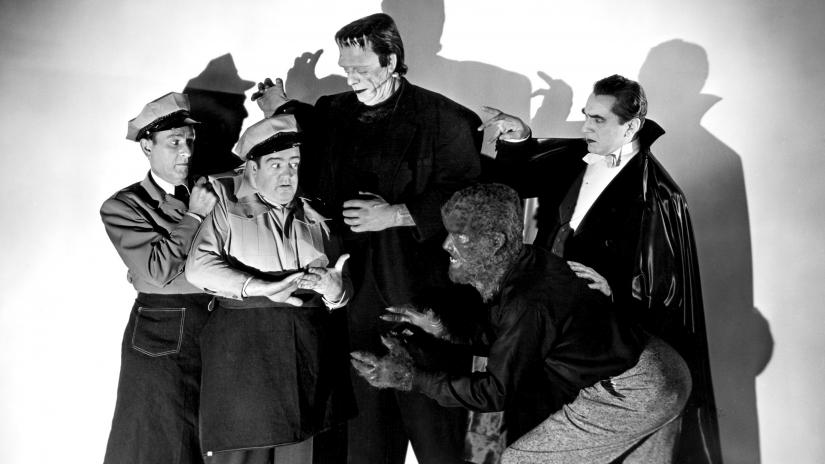
You might think it’s a stretch to refer to the physical slapstick and humorous banter of Abbott and Costello in relation to The Nice Guys. But given Russell Crowe and Ryan Gosling brought up the duo as a favorite and an influence in various interviews (including one with The New York Times), it is only apt to revisit one (or more) of their films prior to seeing Black’s comedy that finds its leads (especially Gosling) in hysterical physical comedy heights. You can honestly pick any one (several of them are available through Amazon), but I’ll throw in this one; which is part of a series of films pairing the duo with various infamous characters of Universal Pictures’ horror flicks. Playing baggage clerks Chick Young (Abbott) and Wilbur Gray (Costello), the duo gets mixed up with a highly dangerous shipment en route to a wax museum called “McDougal House of Horrors”. And, well, hilarity ensues.
Related Topics: Comedy, Culture
